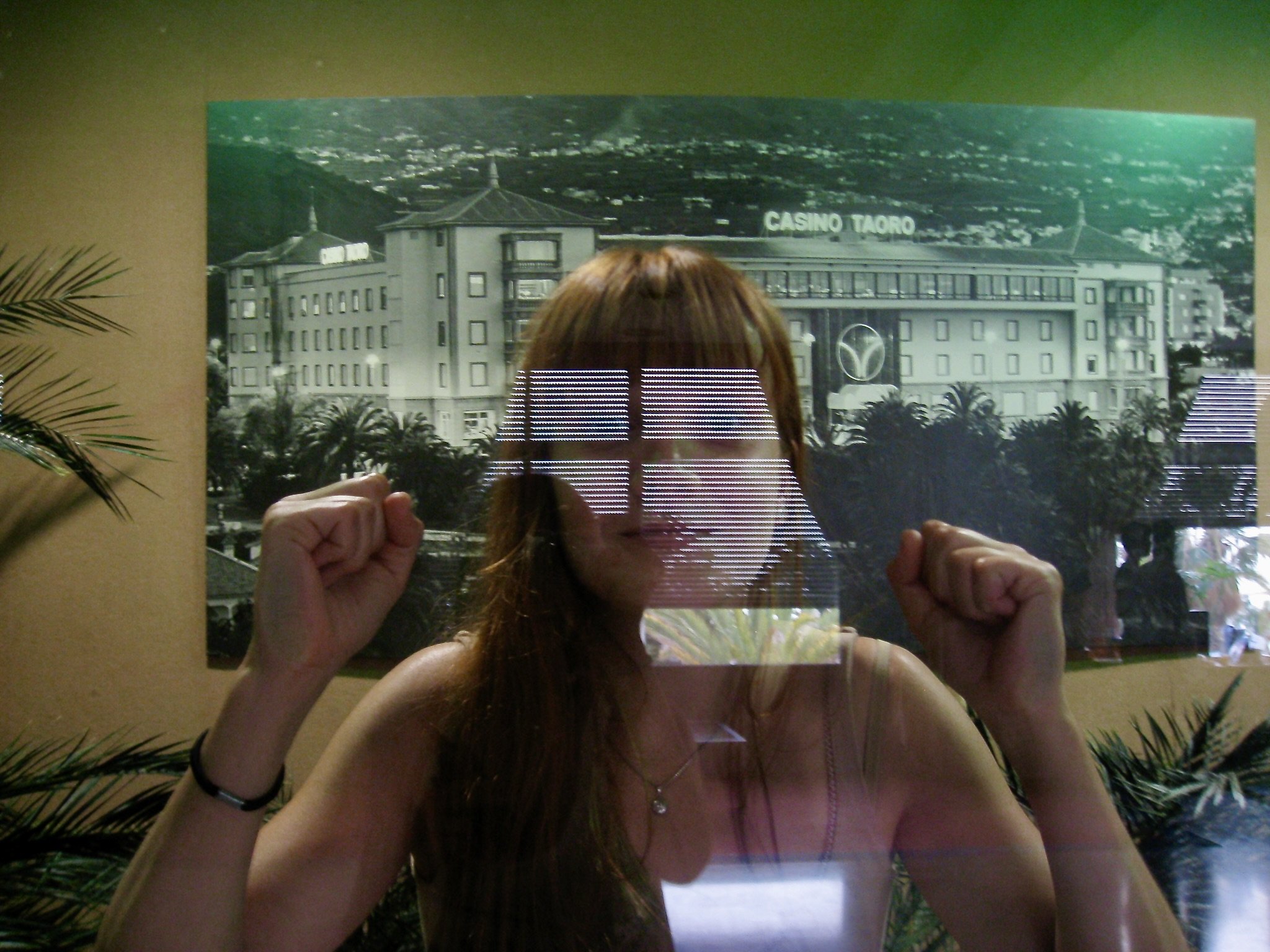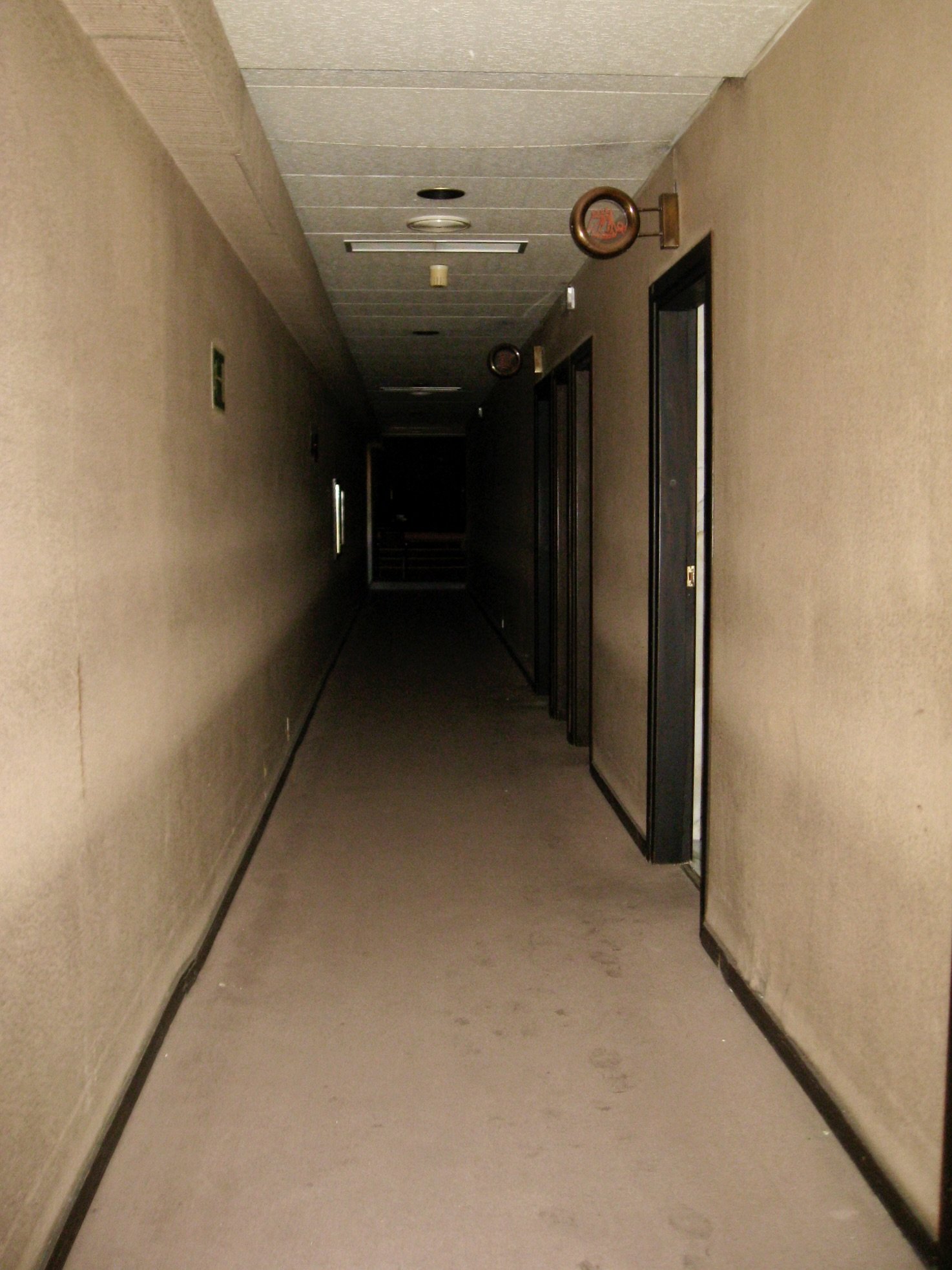On the first time I realised I was masking on set
On my first professional shoot, the best lunch break I’ve had on set, my first glimpse into the abyss, and fascination with derelict buildings.
Shadowing
After I finished my BA in Film Studies, I returned to Madrid to continue my studies and started working on short films, hoping to make it to IMDb (and I did!).
The first time I placed a foot on a professional film set was as a second assistant director apprentice for a short film shot in the then-abandoned Casino Taoro in Tenerife.
I remember how nervous, inadequate and awkward I felt during that one week of shooting. I wanted to prove myself worthy, but the red flags that only made sense so many years later were already fluttering away. I had found the quietest and furthest possible toilets to try to have teeny-tiny breaks whenever, like most other members of my species, I needed to use the toilet. I must have often needed it more than any average human, as I remember being told off several times about how often I did.
I was already overwhelmed by the unhealthy levels of tension and the chaotic environment of a crew working under high pressure - a director/producer/protagonist scenario; need I say more? It probably wasn’t all that chaotic, now that I think of it, but shifts in mood in senior crew members, with voices being raised and people being shouted at… there was a generally unpleasant vibe in the air. I, naively, had no idea that “the film” was this larger-than-life character from a Mizayaki movie. A black oozing mass that must annihilate anything in its way to come to life, regardless of any human tribulations. In essence, I believed that taking a quick pause for my unavoidable human physiological needs was nothing to be ashamed of.
At the time, and until I subjected myself to the wonders of Isotretinoin in my early thirties, I suffered from acne. Surprise, surprise. I was a twenty-year-old with low self-esteem who, only days earlier, had found an unexpected bout of sturdiness to end a convoluted and toxic long-term relationship, which, of course, only worsened the ongoing skin breakout. During the shoot, when I took those ludicrous amounts of holy toilet breaks, I often also tried to cover my spots with a stick of concealer I carried in my bumbag. My acne was pretty bad at that point, making me feel self-conscious in a situation in which I was meant to display my strength of character. This made me feel even more vulnerable in the face of the producer’s nasty disposition. I already felt he had taken issue with me, maybe because the fact I was sleeping on his living room couch and had to bear witness to him and his girlfriend having loud sex every night made him feel awkward, so he deflected this negativity onto me.
There was an incident from that week that has stuck with me for life. I had just laid out the tables to help serve lunch. Instead of sitting down to eat the lukewarm meaty soup (because dietary requirements were mere indulgences back then), I ran to the toilet directly opposite the dining area. It was then that the producer/director/star saw me hastily dabbing concealer on my face in front of the bathroom mirror. Someone had left the door to the corridor half open when he happened to walk by on his way to lunch. When I sat back down at the table, he loudly informed the assistant director I was shadowing, in a disdained tone “I just saw your so-called apprentice applying make-up in the bathroom. Doesn’t she have anything better to do!?”. He more than achieved his intention to humiliate me in front of the whole crew despite me having done whatever I chose to do in the said bathroom during my legal lunch break. Well… as legal as it can be for an unpaid apprentice sleeping on a living room couch.
I was a wreck.
My boss later gave me a good scolding and a severe chat about professionalism and about how I had let him down when he had put me forward for this “opportunity”.
At the time, I had no voice to confront the bully producer; worse, I thought I was in the wrong. It was my first job in film, and my confidence had already become a little smaller.
Jokingly revealing my inner feelings in the creepy hotel lobby - most of the pimples cleverly disguised.
Another highlight of this experience involved the niece of said producer/director/star, who also joined the shoot for a few days to learn the craft. We couldn’t be more different: she was tall, confident and assertive. She was untouchable. One morning, I commented on how astonishingly earlier than their call time, actors were showing up - around 60 to 45 minutes ahead of schedule. It was meant to be an upbeat remark - a compliment.
Not my brightest moment, I know. I am incredibly awkward, and small talk doesn't come naturally. Everyone else seemed to have something amiable or funny to say along with their greeting. I wanted to appear friendly, too, but I had no clue how to, so I said the first thing that ran through my head. She called me out on discouraging the cast from arriving early and displayed a lot of saviour faire in the business. She had a point, and I have always felt grateful for her insight, even if it was delivered in a not-so-nice tone. It marked the first time I realised I was consciously (and clumsily) trying to blend in in a work environment. This wasn’t like when a friend hugged me tight, and I stood tensely with my arms closely stretched parallel to my body, not knowing what I was supposed to do in return. In those cases, I could be myself, and my friends gently joked about me being stiff as a log.
In essence, I was masking.
There is one silver lining to this story. On the last day of the shoot, my boss allowed me to explore the building for an hour while discussing business with the producer/director/star. I had been nagging him all week, so he finally gave in, feigning reluctance, because he was overriding health and safety concerns, but it was the Wild West in those days for good and evil.
Here are some pictures I took with my crappy digital camera. I was ecstatic to finally have some time alone to breathe and explore, which I honestly found a more enjoyable experience than any minute of the rest of that week.
Dear Marty
I went to see Killers of the Flower Moon (dir. Martin Scorsese, 2023) at the cinema this weekend. The least interesting aspect of the film is the one I am about to pick upon. After watching the film, which runs 206 minutes, I read a couple of articles online that made want to (*gasp*] share some thoughts with the www.
Voicing my opinion is not something I have been used to doing in the last thirty years of my life, so doing so lately, especially when online, makes me feel vulnerable, scared and triggers my rejection sensitivity disphoria. But it’s like with tattoos, you know? Once you get one, you realise it wasn’t that big a deal to have something imprinted on you for life because ultimately, it doesn’t actually matter. So here it goes:
Dear Mr. Scorsese,
With utmost respect to your latest feature and in response to the following comment: "People say it's three hours, but come on, you can sit in front of the TV and watch something for five hours. Also, there are many people who watch theatre for 3.5 hours. There are real actors on stage; you can't get up and walk around. You give it that respect; give cinema some respect."
I have a couple of thoughts to share on the subject:
I have not been to the theatre in the US many times, but from my 11 years of experience attending the theatre in London, I simply cannot remember attending any three-hour play that did not include an interval.
Yes, there may be people who can watch TV for 5 hours straight, but I am pretty sure they will get up for a toilet break, snack, etc. at some point, and most of the time, they can pause what they are watching.
The issue with a 3.5-hour film, in my opinion, is that if I do need a toilet break, for instance, I will have to gage when I think it will be a good time to leave for 5 minutes, so I will be distracted thinking about that until I finally make a decision and then worry that I will miss an important scene or part of the plot.
Unless you're sitting at the end of a row (which I tend not to do because I'm pretty picky about where I sit at the cinema to have the most central viewing experience when given a chance), you will likely have to bother several people whilst leaving your seat. Depending on the theatre, the spaces between rows can be very narrow, and it may require viewers on your row to stand up, remove their bags/clothing from the floor, etc., so I'm unwillingly disrupting their experience because of an inevitable physiological necessity.
Not only do I feel uncomfortable bothering other cinema-goers when leaving, but I also have to do it all over again when coming back to take my seat, which may or may not coincide with an emotional, impactful, etc. scene.
This is more disrespectful to the film than to have an interval during which all the audience in the room gets a chance for a bathroom break, replenish liquids, etc., at the same time, avoiding individual viewers' stress over when to get up or if to get up at all - perhaps, as I have done many times, they will just uncomfortably sit it through until the end, feeling distracted and in pain by the impetuous nature of their physiological needs.
On top of that, when you come back from disrupting others twice already, you may feel compelled (as I do) to whisper to my companion, "What did I miss?" - consequently bothering everyone around me all over again.
Allowing intervals may increase revenue for cinemas, given those breaks could mean a second chance for audiences to grab another drink or snack - especially when a film is almost the length of two average feature films, which means it will be likely taking up around two schedule slots, and therefore, half the chance for cinemas to sell tickets (and snacks and beverages).
I agree with the quote from Phil Hoade cited in this article: "No one's going to pretend that bringing back intermissions would suddenly reverse the post-pandemic malaise of movie theatres in the face of Netflix, Disney+ and others. However, especially compared with the degraded home viewing experience, interrupted by social media every 30 seconds, they might help bolster the status of cinemagoing as a prestige event."
Last but definitely not least, it is also a matter of accessibility. Not everyone is comfortable sitting for so long without needing a break of any kind, and not everyone can do it for various reasons, including non-visible disabilities.
I respect your craft and understand how disrupting an interval could be in some instances. Still, since feature films are only getting longer, if we implement intervals for longer than average films, these could be written into the script or recommended at a certain point by the filmmakers themselves.
I am an autistic ADHDer who finds comfort in knowing the running time of any film I'm about to watch. Over the years I have identified potential bothersome distractions and implemented little tricks to not let my mind go adrift and allow me to immerse myself in the cinematic experience. Most revolve around anticipating likely disturbances, such as to always carry a snack, a fidget and a water bottle with me, going to the loo before the film starts, carrying a little note book where I can write thoughts on the films (and note down anything in my to-do list that may be cluttering my headspace during the film). Because there is only so much I can do to control how often I need a loo break, I would have welcomed a well-placed interval in Killers of The Flower Moon. But that's just me.
I am all for respecting film and the cinematic experience, but the audience deserves respect just as much.
Kindest regards,
Irene

































